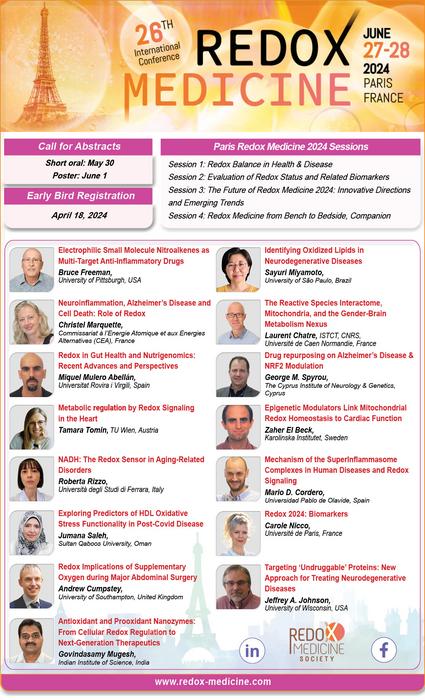The Redox Medicine Society (RMS) is pleased to announce the 26th International Conference of the Redox Medicine, taking place from June 27 to June 28, 2024, in Paris, France. Redox Medicine 2024 will gather the world’s leading experts in redox biology, signaling pathways, and their impact on medicine, promising to highlight the current and future state of Redox Medicine.

Credit: Redox Medicine Society
The Redox Medicine Society (RMS) is pleased to announce the 26th International Conference of the Redox Medicine, taking place from June 27 to June 28, 2024, in Paris, France. Redox Medicine 2024 will gather the world’s leading experts in redox biology, signaling pathways, and their impact on medicine, promising to highlight the current and future state of Redox Medicine.
The influence of redox processes, redox biology, and redox signaling pathways extends across a broad spectrum of physiological and pathological phenomena. A deeper comprehension of the cellular and molecular mechanisms driving these redox interactions is pivotal for the development of innovative therapeutic strategies that will shape the future of medicine.
Among the Speakers & Topics
Bruce Freeman, University of Pittsburgh, USA – “Electrophilic Small Molecule Nitroalkenes as Multi-Target Anti-Inflammatory Drugs”
Mario D. Cordero, Universidad Pablo de Olavide, Spain – “Mechanism of the SuperInflammasome Complexes in Human Diseases and Redox Signaling”
Christel Marquette, Commissariat à l’Energie Atomique et aux Energies Alternatives (CEA), France – “Neuroinflammation, Alzheimer’s Disease and Cell Death: Role of Redox”
Zaher El Beck, Karolinska Institutet, Sweden – “Epigenetic Modulators Link Mitochondrial Redox Homeostasis to Cardiac Function”
Tamara Tomin, TU Wien, Austria – “Metabolic regulation by Redox Signaling in the Heart”
Laurent Chatre, ISTCT, CNRS, Université de Caen Normandie, France – “The Reactive Species Interactome, Mitochondria, and the Gender-Brain Metabolism Nexus”
Miquel Mulero Abellán, Universitat Rovira i Virgili, Spain – “Redox in Gut Health and Nutrigenomics: Recent Advances and Perspectives”
Roberta Rizzo, Università degli Studi di Ferrara, Italy – “NADH: The Redox Sensor in Aging-Related Disorders”
Andrew Cumpstey, University of Southampton, United Kingdom – “Redox Implications of Supplementary Oxygen during Major Abdominal Surgery”
Carole Nicco, President of Redox Medicine Society – “Redox Medicine 2024: Biomarkers”
Sayuri Miyamoto, University of São Paulo, Brazil – “Identifying Oxidized Lipids in Neurodegenerative Diseases”
Jumana Saleh, Sultan Qaboos University, Oman – “Exploring Predictors of HDL Oxidative Stress Functionality in Post-Covid Disease and Relation to Severity”
Govindasamy Mugesh, Indian Institute of Science, India – “Antioxidant and Prooxidant Nanozymes: From Cellular Redox Regulation to Next-Generation Therapeutics”
Jeffrey A. Johnson, University of Wisconsin, USA – “Targeting ‘Undruggable’ Proteins: New Approach for Treating Neurodegenerative Diseases”
George M. Spyrou, The Cyprus Institute of Neurology & Genetics, Cyprus – “Drug repurposing on Alzheimer’s disease & NRF2 Modulation”
Share your studies and be part of the Redox Medicine 2024 experience.
For more information about the conference program, speakers, and more, please visit the website: www.redox-medicine.com.
About Redox Medicine Society
Since 1998, the Redox Medicine Society (RMS), former ISANH, is dedicated to advancing the understanding and application of redox science in health and disease. RMS aims to facilitate the translation of basic knowledge of redox science into molecular medicine and to discover innovative new approaches to prevention, diagnosis and treatment. Through conferences, publications, and collaborations, the society seeks to promote innovation and excellence in the field of Redox Medicine and Science.
Become a part of the RMS community, comprising over 3500 professionals from diverse fields associated with redox, oxidative stress, and health, to share your knowledge and gain insights from our collective expertise. Membership Details.




